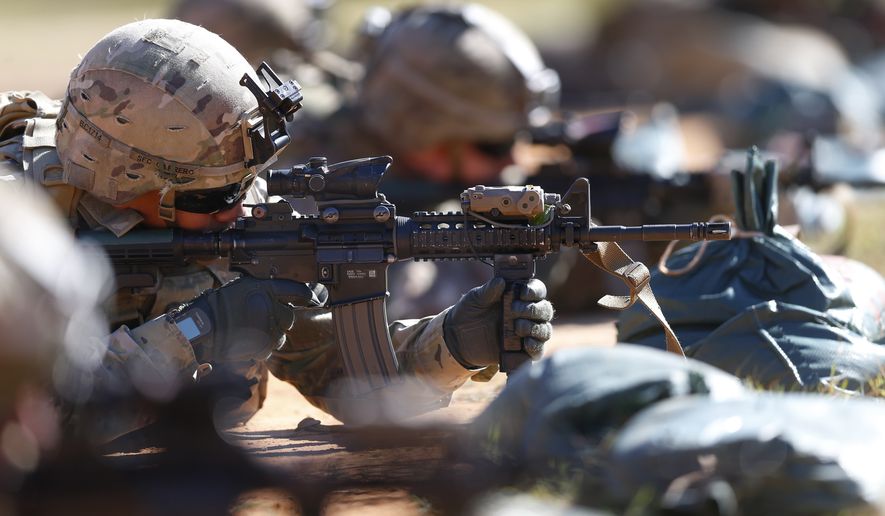Fighting will now take precedence over dealing with transitioning transgender troops, drug abuse and other issues as the Army seeks to overhaul its training regimen to hone its soldiers’ battlefield skills.
In a series of servicewide memorandums approved by Army Secretary Mark Esper and Chief of Staff Gen. Mark Milley and obtained by The Washington Times, service leaders are making optional previously mandatory training on issues such as transgender transition and drug abuse. The move, Army leaders argue, is designed to relieve stress on the overburdened troop training regimen and refocus on soldiers’ ability to fight in combat.
“The Army’s regulations and policies that deal with training were pretty settled, and there were not a lot of detractors to it. … It was all the other [training] requirements that we levied on ourselves, or we had levied from other places” that led to the increasingly cumbersome approach to combat readiness, said Col. John O’Grady, chief of the Army’s collective training division.
Those mandated training requirements “served as barriers to maximizing time … to build readiness and lethality” within combat units, he said in an interview. Aside from ending mandatory training programs on transgender troops and drug abuse, courses on media awareness and human trafficking have been eliminated from the mandatory curriculum, the service memorandums state.
Army officials are codifying the new marching orders into servicewide training guidelines and doctrine, which will bring the Army more in line with the Pentagon’s new National Defense Strategy, Col. O’Grady said.
The strategy, which was one of Defense Secretary James N. Mattis’ earliest policy initiatives, shifted away from the George W. Bush and Obama-era strategies dominated by battling extremist groups including al Qaeda, the Taliban and Islamic State, and putting the priority on challenging traditional nation-state rivals such as China and Russia. It also placed a greater emphasis on increasing lethality in conventional combat operations.
SEE ALSO: Army adding 2 months to Basic Combat Training for deadlier ‘baseline’ infantrymen
Along with scaling back noncombat training mandates, service leaders are also extending the time soldiers spend in infantry training. Soldiers graduating from the nine-week basic training course will now spend an additional two months in “advanced individual training” before heading to their first duty stations.
New soldiers currently spend about six weeks in advanced individual training before deploying. Courses based at Fort Benning, Georgia — dubbed “Home of the Infantry” — will be the first to implement extended training, Military.com reported.
Other previously required training regimens — covering issues such as pre-deployment cultural awareness skills, combat survival and evasion, and dealing with improvised explosive devices — will now be carried out at the discretion of unit commanders.
Empowering commanders
Pushing command-level decision-making processes down to unit-level officers has been a trend for U.S. forces since Mr. Trump took office.
President Trump’s approval of a Pentagon plan last year to allow senior U.S. and coalition commanders in Iraq and Syria to delegate command of American air power down to the tactical level was widely welcomed by many military officers, who chafed at times from the close scrutiny of battlefield decisions under President Obama. The new Army training doctrine reflects a similar spirit of deference, Col. O’Grady said.
“One of the things this did is reinforce to commanders out in the field that you have the authority and responsibility to ensure your units are as highly trained as humanly possible” to carry out combat operations.
Eliminating mandatory training for transgender troops wades into the ongoing policy debate between the White House and federal courts over transgender troops in the ranks. Judge Marsha Pechman of the U.S. District Court for the Western District of Washington this month became the latest judge to block Mr. Trump’s ban on transgender troops in the military.
Army officials say the decision to eliminate mandatory training for transgender troops was not made for ideological reasons, but because the effort had already run its course.
“Transgender training is complete across the Total Army,” one of the service memorandums states.
The initial push for mandatory training on transgender troops was to educate older officers and senior noncommissioned officers unfamiliar or uncomfortable with transgender troops, an Army official said. Younger, junior officers and newly enlisted soldiers do not require the same level of education on transgender issues.
But critics say Army leaders are doing a disservice to transgender soldiers and their units by canceling the mandatory training.
Army leaders engaged in a vigorous debate “balancing pros and cons and prioritizing what you expect” from the new training policies, particularly focused on transgender and other social issues, Col. O’Grady said.
While any decision was bound to spark debate, “I would offer [Mr. Esper] is probably pretty savvy on all of those decisions,” he added.
• Carlo Muñoz can be reached at cmunoz@washingtontimes.com.




Please read our comment policy before commenting.